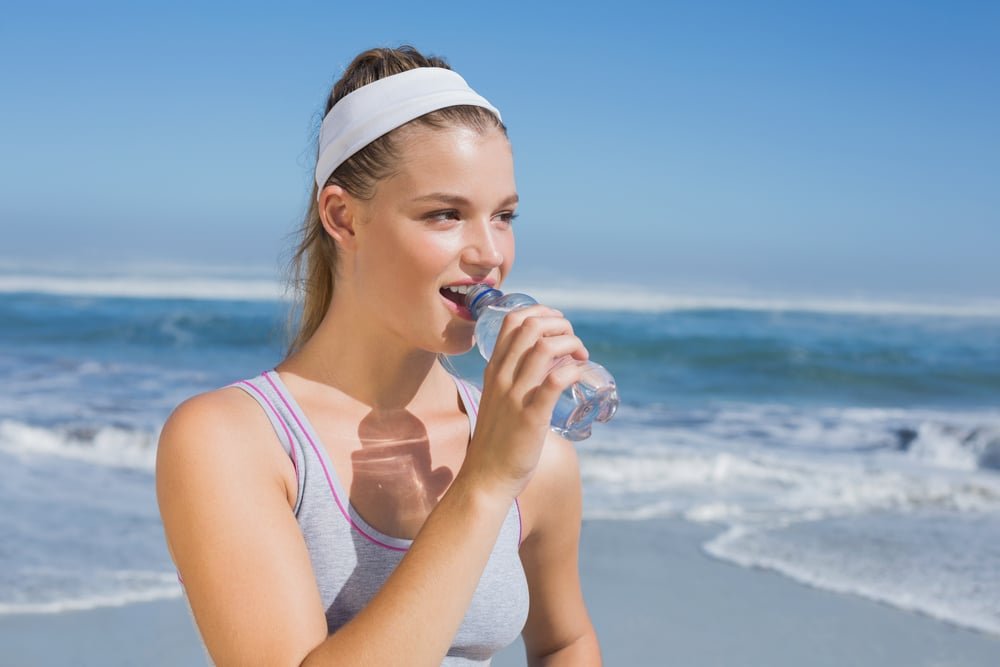
Summer vacations are a time to unwind, relax, and escape from the stresses of everyday life. Whether hitting the beach, exploring a new city, or embarking on a road trip, summer vacations offer a much-needed break to recharge and rejuvenate.
While planning a summer vacation can be exciting, it’s important to prioritize safety and health. Dehydration can take a great time and turn it into a nightmare. From IV therapy to alarms reminding you to stay hydrated, check out our six tips for staying hydrated on vacation to have a memorable and rejuvenating summer getaway.
- Carry a Reusable Water Bottle
Carrying a reusable water bottle on a summer vacation can be a beneficial tool for staying hydrated. Not only does it allow you to have water with you at all times, but it also helps you avoid purchasing single-use plastic water bottles, which are not only bad for the environment but can also be more expensive in the long run.
Reusable water bottles are often made from durable materials, such as stainless steel or BPA-free plastic, and come in a variety of sizes and designs to fit your needs and style preferences. Carrying a reusable water bottle can also help you track how much water you drink, as many bottles are marked with volume measurements. This can be especially helpful when reaching a specific daily water intake goal.
- Drink Plenty of Water Before and After Physical Activity
Drinking water before physical activity helps prepare your body for the upcoming exertion and can help prevent dehydration. It also helps regulate body temperature and keeps your muscles functioning properly. Aim to drink at least 16 to 20 ounces of water two to three hours before physical activity and then another eight to 10 ounces right before starting.
After physical activity, drinking water helps replenish fluids lost through sweating and can help prevent post-workout dehydration. Aim to drink at least eight to 10 ounces of water within 30 minutes after physical activity and continue to drink throughout the day.
- Snack on Hydrating Foods
Hydrating foods, such as fruits and vegetables, contain a high percentage of water. Some examples of hydrating fruits include watermelon, strawberries, cantaloupe, grapefruit, and peaches. Vegetables high in water include cucumber, celery, lettuce, zucchini, and tomatoes. These foods help keep you hydrated and provide valuable nutrients and fiber that keep you full and satisfied.
Another benefit of snacking on hydrating foods is that they can help replace electrolytes lost through sweating. To incorporate more hydrating foods into your summer vacation diet, try packing fresh fruits and vegetables for on-the-go snacking.
- Avoid Alcohol and Caffeinated Beverages
Alcohol is a diuretic that increases urine production and can lead to dehydration. When you’re out in the sun or engaging in physical activity, your body needs even more water to stay hydrated. Drinking alcohol on top of this can put your body under even greater dehydration, leading to fatigue, dizziness, and other unpleasant symptoms.
Caffeinated beverages such as coffee, tea, and soda can also contribute to dehydration. While caffeine can temporarily boost energy, it can also increase urine output and cause you to lose water more quickly.
Opt for water, sports drinks, or electrolyte-rich beverages to help replace fluids lost through sweating. If you do choose to drink alcohol or caffeinated beverages, make sure to drink plenty of water as well to help offset their dehydrating effects.
- Set Reminders To Drink Water
One way to help ensure you drink enough water is to set daily reminders. You can use your phone’s alarm or an app specifically for hydration tracking. Some apps even allow you to input your weight and activity level to give personalized recommendations for how much water you should drink.
Setting reminders can be especially helpful if you’re prone to forgetfulness or have a busy itinerary planned for your vacation. By reminding yourself to drink water regularly, you can help prevent dehydration and keep your body functioning optimally.
6. IV Therapy
Intravenous (IV) therapy delivers fluids and nutrients directly into the bloodstream through a vein. This method is becoming increasingly popular for those looking for a quick and effective way to replenish fluids and nutrients lost during hot weather, physical activity, or travel.
IV therapy can be a convenient option for those on summer vacation looking for a quick hydration boost. The fluids and nutrients delivered through IV therapy can help combat dehydration, headaches, and fatigue caused by traveling, drinking alcohol, or spending time in the sun. Even better, IV therapy can often come to you, saving you an inconvenient trip.
Quench Your Thirst
Carrying a reusable water bottle, drinking water before and after physical activity, snacking on hydrating foods, avoiding alcohol and caffeinated beverages, setting reminders to drink water, and even IV therapy each has their own benefits and can help keep you healthy and comfortable during your travels. You can ensure a safe, enjoyable, and healthy summer vacation by prioritizing hydration and consciously drinking enough water throughout the day.
ATTENTION READERS
We See The World From All Sides and Want YOU To Be Fully InformedIn fact, intentional disinformation is a disgraceful scourge in media today. So to assuage any possible errant incorrect information posted herein, we strongly encourage you to seek corroboration from other non-VT sources before forming an educated opinion.
About VT - Policies & Disclosures - Comment Policy





